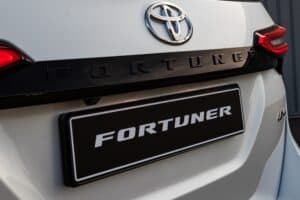Isuzu's seven-seater SUV updated with attractive new looks and more technology.

The Isuzu D-Max holds a comfortable place at the local top bakkie table, but its SUV sibling, the MU-X, is akin to the adage of having a brother in prison. You love him, but do not speak about him.
Like the bakkie segment, the body on frame SUV space is also headed by Toyota. In an average month the Fortuner holds around half of the market share, with the Ford Everest a distant but steady second.
The third place is an almighty scrap between the Isuzu MU-X and Mahindra Scorpio-N, with the Mitsubishi Pajero Sport also in the mix.
But even during months when the MU-X does edge the Scorpio-N, it doesn’t come close to the kind of market share the D-Max has established in the bakkie race. Or in markets like Australia for example.
Slowly but surely
Isuzu is not under the illusion that the facelifted MU-X is going to perform miracles. But the Japanese manufacturer hopes it can at least build on the gradual single-digit percentage growth the SUV has achieved since the introduction of the second generation locally in 2021.
The facelifted version of the seven-seater SUV features styling enhancements and more technology on board. It keeps the 1.9 and 3.0-litre powertrains from before across six models, with the refined flagship model now adopting the Onyx XT moniker in becoming the first local Isuzu to break the R1-million barrier.
Seeing the facelift MU-X from the front approaching from a distance gives off serious previous generation Mercedes-Benz GLE vibes. The updated Isuzu MU-X features a redesigned front bumper which houses a model specific grille flanked by redesigned LED headlights.
The grille and redesigned fog lights bezels share the same honeycomb pattern, with the ISUZU lettering moving up from the grille to below the bonnet line.

Onyx XT looks the part
The German inspired styling continues at the rear were the full-width lightbar between the revised LED taillight cluster is reminiscent of the Audi Q8.
LS and LSE models ride on 18-inch alloy wheels, with the Onyx XT kitted out in gloss black 20-inch rims. The latter works a charm along with a blacked-out grille with the XT badge, magnetite accents, gloss black wheel arch cladding and black side steps, mirrors caps and roof rails.
Moving to the inside, the MU-X’s dashboard has been revamped, while new colours feature on the doors and armrests. The seats also feature reworked leather patterns.
ALSO READ: Can new entry-level Isuzu MU-X dent Toyota Fortuner’s pride?
More tech inside Isuzu MU-X
Now standard across the range is a nine-inch infotainment system with wireless Apple CarPlay and Android Auto. The touchscreen systems now feature five touch-sensitive switches alongside the two rotary dials as before.
The instrument cluster features a redesigned seven-inch multi-information display flanked by an analogue tachometer on the left and fuel and temperature gauges on the right.
Standard across the range is push-start, electric front seats and front and rear parking sensors. In addition, LSE models get 360-degree camera and paddle shifters, while the Onyx XT boasts adaptive cruise control and heated front seats.

No change in power
A decent set of safety systems is standard across the range, with the Isuzu MU-X Onyx XT benefitting from advanced systems like lane departure warning.
The 1.9-litre blown diesel mill produces 110kW of power and 350Nm of torque, sent to the rear wheels via six-speed automatic transmission.
The 3.0-litre turbodiesel engine produces 140kW/450Nm and is also mated to a six-speed auto box. All-wheel drive is standard on the Onyx XT, while the other 3.0-litre models offer a selection between rear-wheel or four-wheel drive.
Smooth drive
A recent launch drive around the Cape Winelands was enough for the 3.0-litre mill to prove to The Citizen Motoring that it has plenty of urge with little turbo lag. It offers a refined ride with smooth gear changes. Off the beaten track, the MU-X is as capable as you’d come to expect from an Isuzu off-roader.
The updated Isuzu MU-X looks and feels better than its ever been. But the reality is that it is still playing catch-up to the Ford Everest and dated Toyota Fortuner. It’s hard to imagine a price tag that breaches seven digits for the flagship will be justified for many more than the Isuzu faithful.
Isuzu MU-X pricing
- MU-X 1.9 Ddi LS 4×2 AT – R752 300
- MU-X 3.0 Ddi LS 4×2 AT – R852 600
- MU-X 3.0 Ddi LS 4×4 AT – R939 500
- MU-X 3.0 Ddi LSE 4×2 AT – R886 700
- MU-X 3.0 Ddi LSE 4×4 AT – R973 700
- MU-X 3.0 Ddi Onyx XT 4×4 AT – R1 026 800
*Pricing includes five-year/90 000km service plan and five-year/120 000km warranty.
Support Local Journalism
Add The Citizen as a Preferred Source on Google and follow us on Google News to see more of our trusted reporting in Google News and Top Stories.






